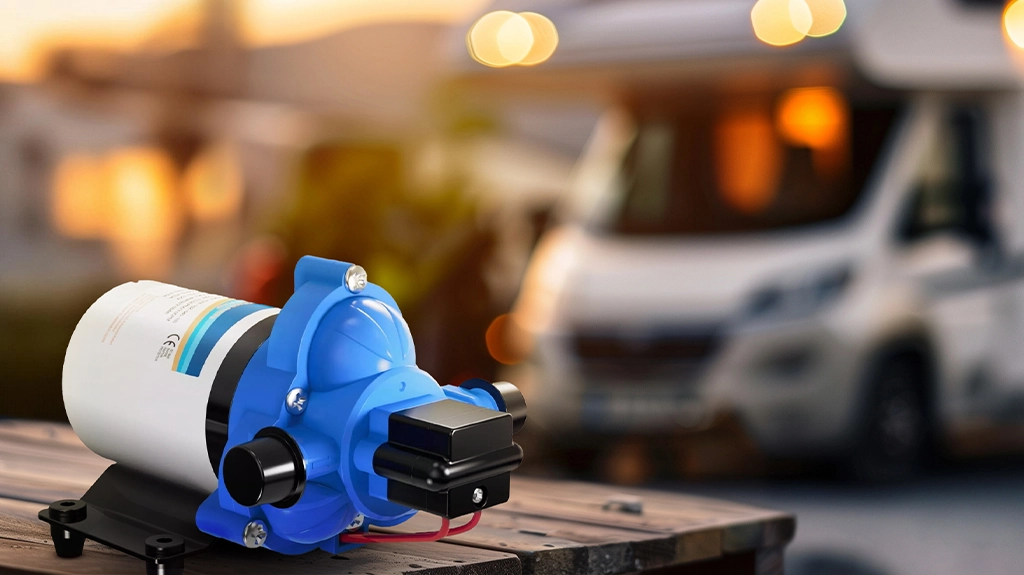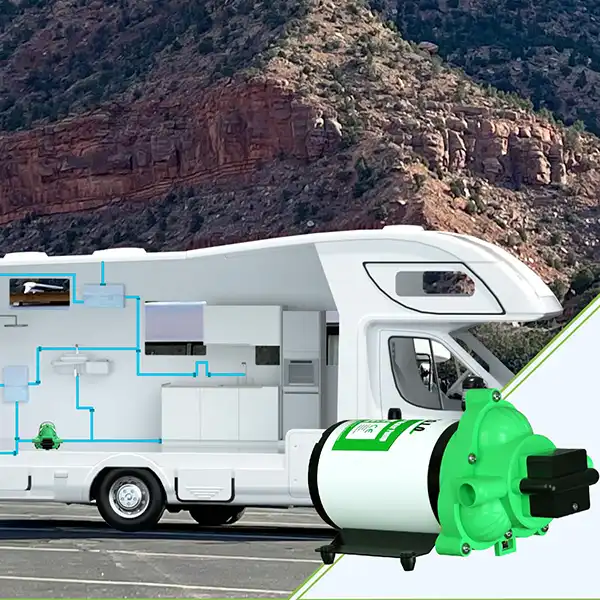When it comes to RV life, there’s one thing we can’t overlook—water. Whether you’re on a weekend trip or a cross-country adventure, your RV’s water system needs to run smoothly. And that’s where the water pump comes in. If your RV water pump starts giving you trouble or simply needs replacing, you’ll want to choose the best RV water pump to keep everything running smoothly.
Having gone through the process of selecting and installing a replacement myself, I’ve learned a few things along the way. From understanding the different types of pumps to DIY tips, let me walk you through what I’ve found to be the best practices for choosing an RV water pump for your specific needs.

How to Choose the Best RV Water Pump for Your RV Model
1. Know Your RV Model and Requirements
Before you even think about picking a best RV water pump, you need to understand your RV’s water system. It’s important to match the pump with your RV’s size, plumbing layout, and water usage. Some RVs need a more powerful pump for larger water tanks, while others have a simpler setup that calls for a smaller, quieter pump.
- RV Size: A large Class A motorhome will need a more powerful pump than a smaller Class C or a trailer.
- Water Tank Capacity: If you have a larger water tank, you’ll need a pump that can keep up.
- Plumbing Setup: Whether you have a single sink or multiple showers and appliances can also influence the pump size.

2. Types of RV Water Pumps
Not all water pumps are created equal, and choosing the wrong type could be a headache down the road. Here are the common types of RV water pumps you’ll encounter:
- Demand Pumps: These are the most common and are activated when you turn on the tap. They maintain pressure, so the water flow remains steady without requiring an accumulator tank.
- Shurflo and Flojet Pumps: These two brands are industry favorites. They offer smooth, high-performance pumps that minimize pulsation and keep your water flow consistent.
- Diaphragm Pumps: The heart of many RV systems, these pumps work by moving water through a series of diaphragms and valves. They offer great pressure and reliability, making them ideal for larger rigs.
- Vibration-Free Pumps: These types of pumps are designed to reduce noise and vibrations. This is an excellent option if you value peace and quiet during your adventures.

3. Top Picks for the Best RV Water Pumps
Based on my experience and what I’ve researched, these are the top-rated pumps you should consider:
- Shurflo 4008-101-E65 (Best Overall)
- This pump is a workhorse that delivers a consistent flow of water, and the installation process is relatively simple, which is a huge bonus if you’re a DIY-er.
- Flojet 03526-144A (Best for Quiet Performance)
- For those who prefer peace and quiet, the Flojet offers smooth operation with minimal noise. It’s perfect for smaller RVs or anyone who doesn’t want to hear the pump running every time they turn on the tap.
- Seaflo 33-Series (Best Budget Option)
- A good balance of affordability and quality, this pump is compact and easy to install. It’s a great choice if you’re looking for a reliable pump without breaking the bank.
- Shurflo 2088-554-144 (Best for High Flow)
- If you have a larger RV or often camp in areas with limited water supply, this pump offers higher flow rates and better pressure than many competitors.

4. DIY Tips for Replacing Your RV Water Pump
Replacing an RV water pump can be a pretty straightforward DIY job. Here are a few tips I’ve picked up through trial and error:
- Before You Begin:
- Turn off the water supply: Always disconnect the water source to avoid any accidental spills or leaks.
- Turn off your electrical power: Water pumps are powered by electricity, so make sure to turn off the RV’s electrical system to avoid any shocks or malfunctions.
- Choosing the Right Pump:
- Look at the specs of your current pump and make sure the new one matches up in terms of flow rate and pressure. Some RVs require a specific model, so check the manual for compatibility.
- Installing the New Pump:
- Carefully remove the old pump and take note of how the hoses are connected. If possible, label the connections before disconnecting them. This will make it easier when you hook up the new pump.
- Install the new pump by connecting the hoses and ensuring the pump is securely mounted. Most pumps come with detailed instructions, so follow them closely to avoid common mistakes.
- Prime the Pump:
- Once installed, you’ll need to prime the pump by turning on the water supply and allowing the pump to fill the lines. Be sure to check for leaks at all the connections while priming.

5. Water Pump Troubleshooting Tips
Even the best RV water pump might give you some trouble now and then. Here are a few things I’ve done to troubleshoot issues:
- No Water Pressure: If the pump is running but there’s no pressure, check for clogs in the system, or see if the pump’s filter is dirty.
- Pump Running Constantly: If your pump is running non-stop, it may be due to an airlock in the system or a pressure switch failure. Make sure the pump is properly primed, and check for leaks in the plumbing.
- Strange Noises: A pump that’s making loud or strange noises might be struggling with air in the lines or have a worn-out diaphragm. Try bleeding the air out or replacing the diaphragm.

6. Additional Tips for Maintaining Your RV Water Pump
Keeping your pump in good shape can extend its life and ensure trouble-free use. Here’s what I do to maintain my pump:
- Regularly Flush the System: I make sure to flush my system with clean water at least once a year, especially if I’ve been using it in areas with hard water.
- Winterize the Pump: When storing my RV for the winter, I always make sure to winterize the plumbing and the water pump to avoid freezing and damage.
- Clean the Filter: Most pumps come with a filter. I clean mine every few months to keep things running smoothly.
Conclusion:
Choosing the best RV water pump isn’t just about finding the cheapest option—it’s about matching the right pump to your RV’s needs. With the information and tips shared here, you’re equipped to make an informed decision and tackle the installation yourself. Whether you’re replacing your old pump or upgrading to something more efficient, a reliable water pump will keep your adventures comfortable and stress-free.
Remember, when it comes to RV life, small upgrades like a new water pump can make a big difference. Happy camping!
